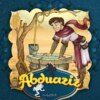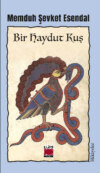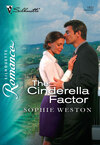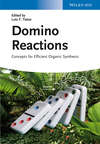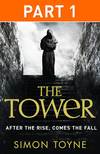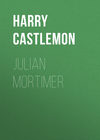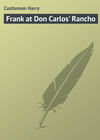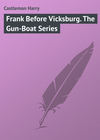Kitabı oku: «Frank in the Woods», sayfa 7
CHAPTER XII
The Moose Shows his Qualities
A SEVERE storm having set in, rendering hunting or trapping impossible, the hunters passed a few succeeding days in-doors, and busied themselves in making a sled and harness for the moose, which, since his capture, had received a large share of Frank’s attention. He had been hitched to a sled regularly every day, and had been trained until he had learned to obey almost as well as a horse. He was very much afraid of a whip, and his only fault was a desire to get over the ground as fast as possible. Sometimes, when fairly started, it was a difficult task to restrain him. But the boys, far from considering this a failing, looked upon it as a quality worth cultivating; and their horned horse was always allowed to show off his speed to the very best advantage.
One morning, after the weather became settled, Archie proposed taking a ride up the creek, to which the others readily agreed. The moose was brought from the barn, and after considerable trouble – for the new harness had been made too small – he was finally hitched to the sled. It was their intention to camp in the woods and eat their dinner. After providing the necessary articles, an ax, plenty of ammunition, a supply of coffee, salt, and pepper, a camp-kettle and frying-pan, they sprang into the sled, and waving their hands to Uncle Joe and the trapper, who stood in the door, watching their departure, they shouted to their horned horse, which set off up the creek at a rapid pace.
“Let him out now!” shouted Frank to his cousin, who was driving. “Let him out. We’ve got all day before us, and let us see how fast he can go.”
Archie pulled his cap down over his ears, and commenced shouting to the moose, which almost redoubled his pace, and whirled them over the snow at a rate the boys had never seen equaled by a living animal. His gait was an awkward, shambling trot; and as the boys watched his movements, they could not help laughing outright, whereupon the dogs joined in the chorus, yelping and barking furiously. This frightened the moose, which uttered a loud snort, and throwing back his head, ran faster than ever; and Archie, who began to fear that he was running away with them, pulled and jerked at the lines, but all to no purpose; the moose ran faster and faster, and the boys, who did not pause to consider the danger they might be in, laughed and shouted until they were hoarse. At length Frank exclaimed:
“You had better check him up a little. The first thing you know, the concern will run away with us.”
“I believe that is what the rascal is trying to do now,” answered Archie, pulling with all his strength at the reins. “He has got a mouth like iron.”
“Well, let him go then, until he gets tired,” said George; “he can’t run this way all day, and besides, if we are obliged to spend a night in the woods, it will be no new thing to us. Get up there! Hi! hi!”
Archie, finding that it was impossible to stop the “concern,” as Frank had called it, turned his entire attention to keeping him in the creek, in which he succeeded very well, until, as they came suddenly around a bend, they discovered before them a huge log, lying across the ice. To avoid it was impossible, for the log reached entirely across the creek.
“Stop him! stop him!” shouted Harry. “If he hits that log he’ll break the sled all to smash. Stop him, I tell you!”
“I can’t,” replied Archie, pulling at the reins.
“Let him go, then,” said Frank. “Lay on the whip, and perhaps he will carry us, sled and all, clean over the log.”
This was a desperate measure; but before Archie had time to act upon the suggestion, or the others to oppose it, they reached the log. The moose cleared it without the least exertion, but the next moment there was a loud crash, and Frank, who had seated himself on the bottom of the sled, and was holding on with both hands, suddenly arose in the air like a rocket, and pitching clear over his cousin, turned a complete somersault, and landed on the crust with such force, that it broke beneath his weight, and he sank out of sight in the snow. The next moment he felt a heavy weight upon him, and heard a smothered laugh, which he knew was uttered by Archie. The latter regained his feet in an instant, and making a blind clutch at his cousin – for his face was so completely covered up with snow that he could not see – inquired, as he helped him to his feet:
“Who’s this?”
“It is I,” answered Frank. “But where is the moose?”
“Gone off to the woods, I suppose,” answered Archie. “It’s just our luck. Eh! what? No, he hasn’t – he’s here, safe.”
He had succeeded in clearing his eyes of the snow, and saw the moose struggling desperately to free himself from the sled, which had caught against the log, and was holding him fast. Frank and his cousin at once sprang to secure him, and, while the former lifted the sled over the log, Archie seized the lines, and, in order to render escape impossible, made them fast to a tree. By this time George and Harry had come up, and at once commenced searching about in the snow for their weapons, and the others busied themselves in repairing the runners of the sled, both of which were broken. In a short time every thing was ready for the start. George volunteered to act as driver, provided the dogs could be kept quiet, and, after a few objections from Harry, who “didn’t like the idea of riding after that moose,” they again set out. Fortunately no one was injured in the least – not even frightened – the only damage sustained by the establishment being the breaking of the runners. Boy-like, they gave not one thought to the danger they had been in, but amused themselves in laughing at the comical figures they must have cut, as they all “pitched head-over-heels out of the sled together.” The dogs, however, did not seem to regard it in the light of an amusing adventure, for they could not be induced to enter the sled again. They ran along behind it, keeping at a respectful distance, and the moment the sled stopped, and their masters began trying to coax them in, they would retreat precipitately.
The moose now seemed to have become quieted. Whether it was for the reason that the dogs were kept still, and there was less noise behind him, or that he had been fatigued by his sharp run, the boys were unable to decide. He trotted along at an easy gait, but still going as fast as they wished to travel, until Harry announced “that it was half past eleven o’clock, and high time that they were looking up a place to eat their dinner.” A suitable spot for an encampment was soon selected, and, after the moose had been unharnessed and fastened to a tree, Frank and Harry set out to procure something for dinner, leaving the others to attend to the duties of the camp.
The Newfoundlander, which accompanied the hunters, was sent on ahead to start up any game that might be in his way. After he had led them about a mile from the camp, his loud barking announced that he had discovered something. The boys hurried forward, and found the dog seated on his haunches at the foot of a tall hemlock, barking furiously at something which had taken refuge among the branches.
“It’s a bear,” exclaimed Harry, as soon as he could obtain a view of the animal.
“Yes, so I see,” answered Frank, coolly pouring a handful of buck-shot into each barrel of his gun. “We’ll soon bring him down from there. You be ready to finish him, in case I should miss.”
“Shoot close, then,” answered Harry; “for if you only wound him, he will prove a very unpleasant fellow to have about.”
Frank, in reply, raised his gun to his shoulder, and a loud report echoed through the woods, followed by a savage growl. The shot was not fatal, for, when the smoke cleared away, they discovered the bear clinging to the tree, apparently none the worse for an ugly-looking wound in his shoulder.
“Shoot me if the rascal isn’t coming down!” exclaimed Harry. “Try the other barrel, Frank, quickly.”
It was as Harry had said. The bear was beginning to descend the tree, and his whole appearance indicated that he meant fight. Frank was a good deal surprised at this, for he had great confidence in his double-barrel, and in his skill as a marksman, and had been sanguine of either killing or disabling him at the first shot; but the celerity of the animal’s movements proved that his wound did not trouble him in the least. It was evident that their situation would soon be any thing but a pleasant one, unless the other barrel should prove fatal. Frank could not pause long to debate upon the question, for the bear was every moment nearing the ground, now and then turning toward his enemies, and displaying a frightful array of teeth, as if warning them that it was his intention to take ample revenge on them. Again he raised his gun to his shoulder, his nerves as steady as if he were about to shoot at a squirrel, and carefully sighting the head of their shaggy enemy, pulled the trigger. The bear uttered another of his terrific growls, and after trying in vain to retain his hold upon the tree, fell to the ground. Brave was upon him in an instant, but the bear, easily eluding him, raised on his haunches, and seized the dog in his paws. One smothered howl came from Brave’s throat, and Frank, clubbing his gun, was rushing forward to the rescue of the Newfoundlander, whose death now seemed inevitable, when another charge of buck-shot, from Harry’s gun, rattled into the bear’s head, and again brought him to the ground. Brave was released from his dangerous situation, and the moment he regained his feet he attacked the bear with redoubled fury; but the animal easily beat him off, and rushed, with open mouth, upon Frank.
“Run! run!” shouted Harry; “the rascal isn’t hurt a bit.”
But with Frank, retreat was impossible; the bear was close upon him, and he would have been overtaken in an instant. Bravely standing his ground, he struck the animal a powerful blow, which staggered him for an instant; but, before he had time to repeat it, his gun went flying out of his hands, and he was stretched, stunned and bleeding, on the snow. The bear, no doubt, considered him disposed of, for he kept on after Harry, who, being unable to fire for fear of wounding either Frank or the dog, had been compelled to witness the struggle, without having the power of lending any assistance.
The bear had struck Frank a severe blow, which, for a few seconds, rendered him incapable of action; but as soon as he had recovered, he ran for his gun, and while he was ramming home the charge, he saw Harry’s coat-tails disappearing in a thicket of bushes, and the bear, seated on his haunches, engaged in fighting the dog, which, having experienced some pretty rough handling, had learned to keep out of reach of the dangerous claws.
As soon as Frank had loaded his gun, he hurried forward to put an end to the fight, when a sheet of flame shot out from the bushes, and the bear ceased his fighting, and lay motionless on the snow. A moment afterward Harry appeared, and, upon seeing Frank, exclaimed:
“I’ve finished the job for him! But he gave you fits, didn’t he? Your face is all bloody. I guess he made your head ache!”
“I guess he did, too,” replied Frank. “I tell you, he hit me an awful crack. I had as soon be struck with a sledge-hammer.”
Fortunately, there were no bones broken. After Frank’s wounded head had been bandaged with his handkerchief, the boys proceeded to remove the skin of the bear, which was the largest of his species they had ever seen. Selecting some of the choice parts of the meat, they then started toward the camp.
Their appearance relieved the anxiety the others had begun to feel at their prolonged absence. The story of their adventure afforded abundant material for conversation while they were eating their dinner, which Frank, who had experienced no serious inconvenience from the blow he had received, speedily served up; and many were the speculations in regard to the lecture they would be certain to receive from the trapper, for their “keerlessness.”
It was nearly four o’clock in the afternoon before the boys started for Uncle Joe’s cabin. As it promised to be a fine, moonlight night, they were in no hurry. Allowing the moose to trot along at an easy gait, they sat in the bottom of the sled, enveloped in furs, amusing themselves in shouting and singing, when Archie suddenly exclaimed:
“Look there, boys! Now, see me make that varmint jump.”
The boys looked in the direction indicated, and saw a large, gaunt wolf standing on the bank of the creek, regarding them attentively, and seeming to be not the least concerned about their approach. As Archie spoke, he raised his gun; but the wolf, as if guessing his intention, suddenly turned, and disappeared in the bushes.
“Boys,” said Frank, “that little circumstance has set me to thinking. Supposing that a pack of those fellows should get after us to-night, wouldn’t we be in a fix?”
“That’s so,” answered the others, in a breath, their cheeks blanching at the very thought.
“I never thought of that,” said Archie. “Hurry up, Harry. Lay on the goad, and let’s get home as soon as possible.”
The joking and laughing instantly ceased, and the boys bent suspicious glances on the woods, on each bank of the creek, over which darkness was fast settling, and their hands trembled as they reached for their guns, and placed them where they could be found at a moment’s warning.
Harry urged on the moose, intent on reaching the tree where the accident had happened in the morning, if possible, before dark. That passed, they would feel comparatively safe; for if the wolves should overtake them before they reached the tree, escape would be impossible. The moose shuffled over the snow at a rapid rate, as if he, too, knew that they were in danger; but Harry kept him completely under his control, and in less than half an hour the tree was in sight. After considerable exertion, the sled was lifted over the obstruction, and as the boys resumed their seats, they felt relieved to know that the worst part of the ride had been accomplished; but they had not gone far when, faintly, to their ears came the sound for which they had been waiting and listening – the mournful howl of a wolf. The moose heard it too, for, with a bound like a rocket, he set off on that break-neck pace that had so amused the boys in the morning. But it was far from a laughing matter now. The moose was not running from a harmless noise behind him, but from a danger that threatened them as well.
Presently the dreadful sound was repeated from another part of the woods, still distant, but nearer than before. The boys had often heard the same sound, when seated around their blazing camp-fire, and had smiled to think what a momentary horror would seize upon them as the sound first came pealing from the depths of the woods. But they had no camp-fire to protect them now; nothing but the speed of their horned horse and their own bravery could save them.
In a few moments, another and another joined in the hideous chorus, each nearer and more fearfully distinct than the others. The wolves were closing in behind them from all sides; but with their usual cowardice, were delaying the attack, until a sufficient force could be collected to render an easy victory certain. Up to this time not a wolf had been seen, save the one that Archie had first discovered; but in a few moments they could be heard dashing through the bushes on either side of the creek, and, soon after, the boldest began to show themselves on the ice behind them.
To describe the thoughts that ran with lightning speed through the minds of the terrified boys were impossible. In spite of the piercing cold, so intense were their feelings of horror, that they were covered with perspiration, and every thing they had done in their lives – minute incidents, long since forgotten – seemed spread out before their eyes like a panorama. Rapidly ran the terrified moose; but nearer and nearer came their dreadful pursuers, each moment increasing in numbers, and growing more bold. The moment was fast approaching when they would make the attack.
“Let us commence the fight, boys,” said Frank, in as firm a voice as he could command. “We must kill as many of them as we can, before they close on us. George, take Harry’s gun. Archie, you and I will fire first. Remember now, no putting two charges into one wolf. Harry, keep on the ice. Ready – now!”
The guns cracked in rapid succession, and the howls which followed proved that the ammunition had not been thrown away. The wolves sprang upon their wounded comrades and commenced to devour them, and George seized the opportunity to put in two excellent shots. During the delay thus occasioned, short as it was, the wolves were left far behind, and the boys had ample opportunity to load their guns. Harry, although generally very timid, when he found himself placed in danger, was the most cool and collected one of the party; and it was well that it was so, for it required all his presence of mind and power of muscle to keep the moose on the ice. He was struggling desperately, first to relieve himself of the weight of the sled, and, failing in this, he would make frantic endeavors to turn into the woods. If any part of the harness should break, they would be left at the mercy of their pursuers.
Again and again did the fierce animals overtake them, and as often were some of their number stretched on the snow. At length, a loud hurrah from Harry announced that they were nearing home; and a few moments afterward, just as the wolves were closing around them again, the sled entered Uncle Joe’s “clearing.” The noise of purling waters to the desert-worn pilgrim never sounded sweeter than did the sharp crack of rifles and the familiar voices of the trapper and his brother, to the ears of the rescued boys. The inmates of the cabin had heard the noise of the pursuit, and had rushed out to their assistance.
The moose was speedily unhitched from the sled, and after the boys had closed and fastened the doors of the cabin, they began to breathe more freely.
CHAPTER XIII
The Black Mustang
SUPPER over, the hunters drew their chairs around the fireplace, and Dick, after filling his pipe, and drawing a few puffs by way of inspiration, said:
“I believe I onct told you ’bout havin’ my hoss pulled out from under me by a grizzly bar, didn’t I? Wal, I told you, too, that I ketched another, an’ I had a job to do it, too – to ketch the one I wanted; an’ the time you’ve had tryin’ to ketch that black fox reminds me of it. You know, I s’pose, that large droves of wild hosses roam all over the prairy, an’ them droves ar allers led by some splendid animal – allers a stallion – one that has got the legs to go like lightnin’, an’ the wind to keep it up. An’ he’s allers the cock o’ the walk, too – the best fighter in the drove; an’ when he moves round, it would make you laugh to see the other hosses get out of his way. He holds his place until he dies, unless some other hoss comes along an’ wallops him. Then he takes his place with the common fags o’ the drove, an’ the new one is king till he gets licked, an’ so on. It ar a mighty hard thing to capture one o’ them leaders. You can ketch one o’ the others easy enough, but when it comes to lassoin’ the ‘king,’ it’s a thing that few trappers can do. Jest arter my scrape with the grizzly bar, Bill Lawson an’ me fell in with a lot o’ fellers that war goin’ to spend a season on the Saskatchewan, an’ they wanted me an’ Bill to join ’em; so I bought me a hoss of an ole Injun for a couple o’ plugs o’ tobacker – reg’lar Jeems River it war, too – an’ we started out. My new hoss was ’bout as ugly a lookin’ thing as I ever happened to set eyes on. He war big as all out-doors, an’ you could see every bone in his body. An’ he war ugly actin’, too; an’ if a feller come within reach of his heels, the way he would kick war a caution to Injuns. But I hadn’t been on the road more’n a day afore I diskivered that he could travel like a streak o’ greased lightnin’. That war jest the kind of a hoss I wanted, an’ I didn’t care ’bout his ugly looks arter that.
“For more’n three year, me an’ Bill had been keepin’ an eye on a hoss that we wanted to ketch. He war the leader of a large drove. He war a sort o’ iron-gray color, with a thick, archin’ neck – a purty feller; an’ the way he could climb over the prairy was a caution to cats. We warn’t the only ones arter him, either, for a’most every trapper in the country had seed him, an’ had more’n one chase arter him. But, bars and buffaler! It war no use ’t all, for he could run away from the fastest hosses, an’ not half try; an’ many a poor feller, who straddled a hoss that every body thought couldn’t be tuckered out, had left his animal dead on the prairy, an’ found his way back to his camp on foot. We war in hopes that we should see him, for we war travelin’ right through his country; an’ I knowed that if we did find him, I would stand as good a chance o’ ketchin’ him as any one, for my ugly-lookin’ hoss was the best traveler in the crowd.
“One night we camped on a little stream, called Bloody Creek. We called it so from a fight that a party of us fellers had there with the Injuns. About an hour arter supper, while we war all settin’ round the fire, smokin’ an’ telling stories, ole Bob Kelly – the oldest an’ best trapper in the country – started up off his blanket, an’, cockin’ his ear for a moment, said, ‘Somebody’s comin’, boys.’ An’, sure ’nough, in a few minits up walked a stranger.
“It ar a mighty uncommon thing to meet a teetotal stranger on the prairy, an’ a man don’t know whether he is a friend or foe; but we war mighty glad to see him, and crowded round him, askin’ all sorts o’ questions; an’ one took his rifle, an’ another pulled off his powder-horn an’ bullet-pouch, an’ a big feller dragged him to the fire, where we could all get a good look at him, an’ made him drink a big cup o’ coffee.
“‘Whar do you hail from, stranger?’ inquired ole Bob Kelly, who allers took them matters into his own hands, an’ we little fellers had to set round an’ listen.
“‘I b’long anywhere night ketches me,’ answered the stranger. ‘I’m an ole trapper in these yere parts.’
“‘Whar’s your hoss?’ asked ole Bob.
“‘I left him dead on the prairy – dead as a herrin’. I rid him a leetle too hard, I reckon. I war chasin’ up the black mustang.’
“If I should live to be a hundred year older ’n I’m now, an’ should live among the Blackfoot Injuns the hull time, I shouldn’t expect to hear another sich a yell as ’em trappers give when the stranger mentioned the black mustang. They crowded round him like a flock o’ sheep, all askin’ him questions; an’ he tried to answer ’em all to onct; an’ sich a row as there war round that camp-fire for a few minits! It war wusser nor any Injun war-dance I ever seed. Now, me an’ Bill hadn’t never seed the black mustang, nor heerd o’ him afore, ’cause we hadn’t trapped in that part o’ the country for a’most three year, but we knowed in a minit that it must be the leader o’ some drove. But Bill had lived among the Injuns so much that he had got kinder used to their ways, an’ he didn’t like to see them trappers carryin’ on so, an’ actin’ like a parcel o’ young’uns jest turned loose from school; so, as soon as he could make himself heered, he yelled:
“‘What in tarnation’s the matter with you fellers? As soon as you git through hollerin’, me an’ Dick would like to know what all this yere fuss is about.’
“‘Why, the black mustang has been within ten mile of this yere camp to-night,’ said one of the trappers.
“‘Wal, an’ what o’ that?’ said Bill. ’Ar the black mustang any better hoss than the gray king?’
“They all set up another yell at this, an’ one of ’em said:
“‘Why, the gray ain’t nothin’ ’long side o’ the black mustang. He could run away from him in less’n two minits. I guess you hain’t hearn tell of him, have you?’
“‘In course I hain’t,’ said Bill.
“‘Then you ain’t no great shakes of a trapper,’ said another.
“Now, the rascal knowed that war a lie, for there warn’t no trapper in the country that could lay over Bill, ’cept ole Bob Kelly, an’ every one said as how he war the best trapper agoin’; an’ the way Bill eyed the feller, made him kinder keerful of his we’pons for a day or two arterward.
“Arter talking a little while, we found out the black mustang war the leader o’ the largest drove on the prairy. He had been round for ’bout a year, an’ every trapper in that part of the country had had a chase arter him; but it war like chasin’ the wind; an’ besides this, he could run all day, an’ be jest as fresh at night as when he started in the mornin’.
“‘Wal,’ thinks I, ‘Dick, here’s a good chance for you to try your hoss’s travelin’ qualities;’ an’ I made up my mind that I would start off an’ foller the black mustang till I ketched him, if it tuk me my lifetime.
“The next mornin’, arter breakfast, one o’ the trappers proposed that we should spend three or four days in huntin’ up the mustang, an’, in course, we all agreed to it. The stranger wanted to go, too, but we had no hoss to give him; so, arter biddin’ us all good-by, he shouldered his rifle an’ started out alone acrost the prairy. Wal, we spent a week tryin’ to find that hoss, but didn’t even get a sight at him; so one mornin’ old Bob Kelly concluded that we had better make another strike for the Saskatchewan. We packed up an’ got all ready to start, when I tuk them a good deal by surprise by tellin’ ’em that I war goin’ to stay an’ hunt up the black mustang. How they all laughed at me!
“‘Laugh away, boys,’ says I, as I got on to my hoss. ‘I’ll see you on the Saskatchewan in a month or so, an’ I’ll either bring the mustang with me, or he’ll be a dead hoss. If I can’t ketch him, I can shoot him, you know; an’ I won’t see you agin till I do one or the other. Good-by, fellers.’ An’ I turned my hoss an’ rode away from the camp.
“Wal, I rode all over them prairies for a’most six weeks, without seein’ the sign of a hoss; an’ one arternoon I stopped on the top of a high swell to take my reckonin’. I found myself on the east side o’ the Black Hills, an’ I knowed that my first job was to get on the other side; the mustang had prob’bly struck off toward the mountains. So I began to look around for a good place to get over. The hills rose from the prairy reg’lar bluff-like – sometimes a hundred feet high, an’ so steep that a sheep couldn’t climb up ’em. Jest as it begun to grow dark, I come to a deep ravine, that seemed to run up into the hills a good way; an’ the bottom of this yere ravine was as hard an’ smooth as a floor, an’ looked as if it had been traveled over a good deal. But I war kinder tired with my day’s tramp, an’ didn’t notice it much, for I thought it war nothin’ more’n a buffaler road; so I picked out a good place an’ camped for the night.
“’Arly the next mornin’ I set out agin; but as soon as I got on the road I knowed that no buffaler had made them tracks; they war mustangs, an’ there war the prints of their hoofs in the dust, plain as a bar’s ears. When I come to examine the signs, I found, as nigh as I could kalkerlate, that there war about three hundred hosses in the drove, an’ I knowed, from the looks of the tracks, that they had been along lately; so I pushed ahead as fast as my hoss could carry me, an’ that wasn’t slow, I tell you. I rid him all day at a tearin’ rate, an’ at dark he seemed as willin’ to go as when I started out. This put me in high spirits, an’ I made up my mind that if me and my hoss ever got arter that black mustang, he would have to pick up his feet mighty lively to get away from us. The next day, about noon, I war riding along at a thumpin’ rate, when all to onct I come to a place where the ravine opened into a small prairy, and scattered all over it war the wild hosses, feedin’ away as peaceably as if no one had ever thought of disturbin’ them there. I pulled up so quick that it a’most brought my hoss on his haunches; but the mustangs had seed me, an’ the way they snorted an’ galloped about war a purty thing to look at. I drawed off into the bushes as quick as I could, an’ gathered up my lasso, which I allers carried at my saddle-bow, an’ then looked toward the drove agin. The first hoss I seed was the black mustang. He war runnin’ about, tossin’ his head an’ snortin’ as though he didn’t hardly understand the matter. He war the purtiest hoss I ever sot eyes on; but I couldn’t stop to examine his pints then. Then I tuk a look round the prairy, an’ saw that the hills rose on all sides of it; there was but one way the hosses could get out, an’ that war through the ravine. I war in luck for onct in my life. Now, you boys, if you had been there, would, most like, run out into the prairy to onct, an’ tried to ketch him, but that would have been a reg’lar boy trick, and would have spiled it all. I knowed that I had the black hoss surrounded, but if I begun to race him round that prairy, he would dodge me, an’ be off down the ravine like a shot; so I kept still in the bushes; an’ my hoss knowed his own bisness, and stood as though he war made of rock.
“Purty soon the hosses begun to get over their skeer an’ commenced comin’ toward me – the black hoss leadin’ the way. He would come a few steps, an’ then stop an’ paw the ground, an’ then come a little nearer, an’ so on, till he come within ’bout half a lasso-throw, when, all of a sudden, I give my hoss the word, an’ he jumped out o’ them bushes like a streak o’ lightnin’. It would have made you laugh to see the way them hosses put off; the black hoss, seemed to me, war on wings; but he hadn’t made three jumps afore my lasso war around his neck. The black mustang war mine!
“In about three weeks I reached the Saskatchewan, an’ if you could have heard the yell them trappers give when I rode up to the camp on the mustang, it would have done your heart good. I had kept my promise.”

